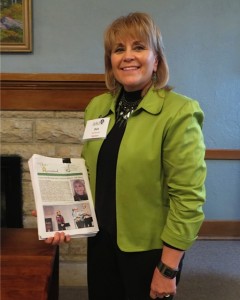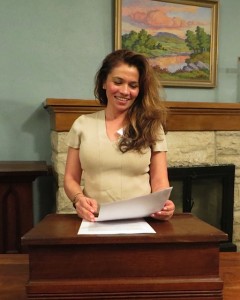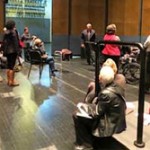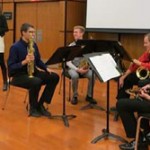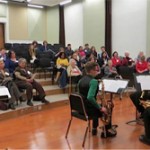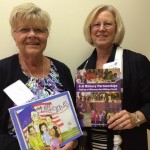April 13, 2015 BRANCH PROGRAM
April Meeting Focuses on Human Sex Trafficking and the Changing Needs of Children is USD 383
Branch co-vice president for programming, Joan Strickler, introduced Pastor Deb Kluttz, founder and executive director of Homestead. The Homestead is a transitional house here in Manhattan for women who have exited the sex industry, are ready for life change, and are also ready for a new career path. Kluttz is the executive pastor at the Westview Community Church in Manhattan and sits on the Board of Trustees for Manhattan Christian College.
Klutz began by reading a moving poem by a former sex industry dancer, titled “Lost Souls of the Night.” Kluttz explained an established definition of human sex trafficking: a commercial sex act induced by fraud force coercion, or when the person involved is not eighteen years of age or older. She noted that while efforts like Homestead are needed, if we want to really address sex trafficking, efforts need to be targeted at the market demand (buyers) of human trafficking.
Kluttz provided facts about sex trafficking: America is the number one destination for sex trafficking victims. World wide, more than one million children enter the sex trade each year. In addition, one hundred to three hundred thousand United States citizens are trafficked every year with in our borders. Approximately 2300 youth under age 18 are victims of trafficking in Kansas each year. The number is even greater in Missouri, where approximately 4700 youth are trafficked each year. The most vulnerable youth are those in foster care and runaways. The interstate trucking industry is a main factor in trafficking through Kansas. Other factors in prevalence of sex trafficking activity: a large migrant population, neighborhoods with strip clubs and escort services, a trucking thoroughfare, unemployment, presence of military bases and casinos.
Kluttz described attending a weekend seminar on the issue of sex trafficking, where she began to understand the four-pronged approach needed to help victims: prevention and awareness, rescue, restoration (healing), and reintegration. Kluttz began training regarding human sex trafficking in 2009. To date, the Homestead Ministry is involved in all four prongs of helping victims of sex trafficking. In 2009, only 100 beds were available in the United States specifically for female victims of human sex trafficking who wanted help.
One of the women on the Women’s Ministry Team at Westview died of influenza. Her husband, knowing she was passionate about helping trafficking victims, donated a large monetary gift to get this work started. Then a member of the congregation offered a rental property. Feldkamp’s furniture furnished the entire home. Next, Westview and other churches, families, and businesses in the Manhattan community got involved by adopting a room to make the house a home. Homestead is a reintegration house for women eighteen years and older who speak English and are ready for life change. They offer job apprenticeships as either a paid or unpaid work training program, depending upon the job site. Community businesses offer the training to help put the woman in a career path. Homestead offers a holistic network of support including an individual growth plan, life skills training, and social worker and other support at the house. Faith-based counseling services are provided through Pawnee Mental Health, thanks to a City of Manhattan grant. The Homestead has just developed a new program, Homestead Plus—women with children in their care are eligible to be placed to live with a local family so mom and child can remain together while mom fully participates in the Homestead Program.
The Homestead has had twenty participants thus far. The program has three graduates in job areas of dog grooming, dental assistance, and property management. Some of the twenty women are still in the program and others left after a short time because they needed more intensive services than Homestead can provide. The Homestead can accommodate six women in house at time, with an indefinite number in Homestead Plus.
The Homestead’s Strip Club Outreach Team currently visits three strip clubs in Junction City and one strip club in Salina with gifts monthly in order to reach out to women who are currently in the sex industry. Following Pastor Kluttz’ talk, the branch had discussion including questions of whether these possibly traumatized women are able to receive the level mental health services they need; whether women are required to participate in religious activities in order to be part of the program; and why participants must be fluent in the English language. Klutz reiterated the support given through Pawnee Mental Health. She noted that Homestead is faith-based. Participants must be willing to participate in religious activities, or at minimum be open to a Christian message. The language requirement is in place due to cost of translators, which Homestead cannot currently afford. Branch president Gatewood thanked Pastor Kluttz for her informative presentation and her work with women in need.
The April meeting also featured an excellent talk by Marie Bovée, branch member, translator and resource person for USD 383. In her talk, “The Changes in Manhattan,” Bovée noted that 50 to 55 languages are spoken in the district; 14% of children in the district require a translator; the poverty rate for children is now 45%; and more than 250 children in our schools have self-identified as homeless.
Federal laws mandate that all children be accepted in public schools regardless of their nation of origin or citizen status. Bovée encouraged branch members to become aware of students’ rights and recognize if a student is in need of advocacy.
March 9, 2015 BRANCH PROGRAM
March Meeting Discusses Branch Involvement in STEM Programs
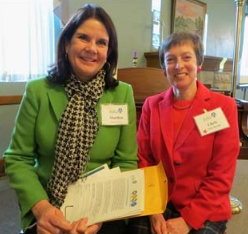
Marilyn Fox (left) and Christine Harold, both of whom are Science, Technology, Engineering, and Math (STEM) educators, presented the March branch meeting program, “Opportunities for Branch Involvement in STEM Programs for Young Women.” Fox recently retired as a science teacher in USD 383; Harold leads the USD 383 STEM team.
Harold defined STEM: “STEM is an approach to teaching and learning that integrates STEM skills through project‐based learning.” The USD 383 STEM team is funded by a Department of Defense grant.
Each year, Harold plans a summer STEM Institute for school children and models how to teach STEM lessons in the classroom. Harold finds engineering concepts to be the most challenging for teachers to integrate into their lesson plans. Harold and her team have visited every 6th grade class in USD 383 and are currently helping to teach these youth to build lego robots.
The STEM Institute for youth grades five through eight runs each summer at K‐State. The cost for students is $100 for four weeks. This year, thanks to Fox’s advocacy, the Manhattan branch of AAUW will sponsor two scholarships to the STEM Institute.
Fox shared why she began to advocate for STEM camp scholarships: Girls are still under‐represented in STEM fields and even at the STEM Institute. Fox would like to make the camp accessible to kids who might otherwise not be able to go and especially to girls.
Fox has distributed applications for the Manhattan AAUW branch STEM scholarship to all schools in the district with students in the eligible age group. The applications will be collected by staff at each school and returned to Fox in the coming month.
New AAUW Report Could Change U.S. Tech Workforce in One Generation
 The American Association of University Women (AAUW) released new research on March 26th highlighting solutions that will change the face of America’s engineering and computing workforce. Solving the Equation: The Variables for Women’s Success in Engineering and Computing asks why there are still so few women in the critical fields of engineering and computing — and explains what we can do to make these fields open to and desirable for all employees. Learn more at https://www.aauw.org/research/solving-the-equation/
The American Association of University Women (AAUW) released new research on March 26th highlighting solutions that will change the face of America’s engineering and computing workforce. Solving the Equation: The Variables for Women’s Success in Engineering and Computing asks why there are still so few women in the critical fields of engineering and computing — and explains what we can do to make these fields open to and desirable for all employees. Learn more at https://www.aauw.org/research/solving-the-equation/
FEBRUARY 9, 2015 BRANCH PROGRAM
February Meeting Focuses on Women Leaders in Manhattan’s African American Community
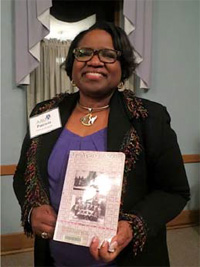
Pat Hudgins, associate director of Career and Employment Services, K‐State.
Vice President for programs, Mary Stamey, introduced the February program speaker, Pat Hudgins, who spoke on “Leaders in the African American Community.” Hudgins is associate director of Career and Employment Services at K‐State and serves as liaison to the College of Education. She is a member of the executive board of the K‐State Black Faculty and Staff Alliance and serves the greater Manhattan community as an elected School Board member. Hudgins is a $tart $mart salary negotiation trainer and has led workshops at K‐State. She holds a B.A.in Media and Mass Communications and an M.S. in Education. Hudgins is a proud mother of three young adults and is married to a local pastor.
During her talk, Hudgins emphasized the theme of “Making a Difference.” In honor of Black History Month, Hudgins spoke about black women inventors, such as Alice Parker who invented central heating in 1919. Many African American inventors were not given proper credit for their inventions. Female black inventors advanced web‐cam and security technology, invented the toaster laser surgery equipment, the stapler, architectural engineering scale, and the hoist loading mechanism … to mention just a few. Hudgins spoke of local leaders an recommended reading the Manhattan history as told in A Hundred and Forty Years of Soul: 1865‐2005, by Geraldine Baker Walton.
Hudgins mentioned the concept of “generals” in a community, meaning those who are willing to do civic and community activist work, saying, “Make a difference where you are and start small.” Among the long list of accomplished local leaders is Dr. Gwen O’Neal, first African American department head at K‐State, who led the department of apparel, textiles, and interior design; Dr. Carla Jones, one of few African American vicepresidents at K‐State; LaBarbara Wigfall, professor of regional and community planning, who has been instrumental in preserving African American history in the state of Kansas.
Hudgins reflected on the fact that there have been relatively few African American teachers and leaders in USD 383. Hudgins is the second African American woman to serve on the school board, and only the third African American to be elected to the school board. Stamey thanked Hudgins and then introduced a portion of Martin Luther King’s speech made at a K‐State Convocation in January 1968, playing a recording made available to the public courtesy of Hale Libraries. This emotionally moving recording was lost to the university for over 50 years until a copy was made from tapes obtained by Dr. Galyn Vesey from KFH radio station in Wichita.
JANUARY 12, 2015 BRANCH PROGRAM
January Meeting Focuses on Women Leaders in Higher Education
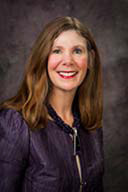
April Mason, Provost, K-State
The January meeting of AAUW Manhattan branch began with a program by Dr. April Mason, Provost of KState, who spoke on “Women Leaders in Higher Education: A Place at the Table.” Mason reflected upon the experience of being the first female vice president of K‐State and her realization that her position makes her a role model for younger women. Mason credited her parents with inspiring her to excel; their attitude was one of doing the utmost to help their children become educated in an area of the child’s interest.
Mason followed her reflection upon her parents as mentors with a description of her experience being mentored as a graduate student and young faculty member at Purdue. She recalled having mentors who helped open doors and encouraged her to take risks.
“You won’t get to the table if you don’t take some calculated risks.”
According to Mason, she was quiet in her first role as a dean. She was considering if she had as much to say as other individuals. After six months, she found her voice ‐ realized she had as much to say and as much right to speak up as her peers. Her advice: “Don’t sit back and not be part of an important conversation.” Mason is proud that those on the president’s cabinet can speak up; Schulz wants input, wants others to push him forward in his thinking.
Mason offered three guideposts for leaders: acknowledge if you’ve done something wrong; praise others; and learn to accept praise. Mason noted that professional women deal with “pot shots” against their demeanor and appearance when they make controversial decisions, noting, “We have to get a thick skin and let it go.” She notes that in the Big Twelve schools, provost positions are now held about equally by men and women. Mason sees a positive change in diverse leadership and increased understanding of the importance of inclusive leadership. She calls for an entrepreneurial attitude in higher education to think of new solutions to maintain high quality higher education.
In discussion with the audience, the idea came forth that women need thicker skins and need to not take all criticism personally. Being a leader means being in the line of fire for criticism. If nobody’s “getting” your idea, maybe it’s the wrong time. Practice patience; practice planting seeds versus advancing your own ideas. Her final advice to women on their career development: push yourself, draw a career map and share it with mentors.
DECEMBER 8, 2014 BRANCH PROGRAM
December Meeting Holiday Tour and Music at McCain
The festive December meeting of the Manhattan AAUW branch included a backstage tour of McCain Auditorium, refreshments with hot cider, and chamber music by a saxophone quartet. The program began with a tour of K‐state’s McCain Auditorium facility, led by K‐State staff member Kyle McGuffin. McGuffin recounted the history of McCain and revealed the many architectural, acoustic, and stage design features of the auditorium. Following the tour, AAUW members and guests enjoyed refreshments during a brief and lively business meeting.
- Backstage tour of McCain Auditorium, K-State
- Dr. Anna Marie Wytko’s Saxophone Quartet
- A section of members listening to the performance
The meeting concluded with a chamber music performance by Dr. Anna Marie Wytko’s saxophone quartet. Dr. Wytko’s quartet is composed of K‐State students, each of whom was awarded a seat in the quartet based upon quality of audition performance, not seniority in studies.
This year, the quartet is composed of one senior and three freshmen: Michael Meier (soprano saxophone), Tucker Rayl (alto saxophone), Jacob Wright (tenor saxophone), and Christopher Opperman (baritone saxophone).
The quartet played compositions by Phil Woods, J.S. Bach, George Gershwin, Stephen Foster, and Jean Rivier, as well as suite of traditional holiday music arranged by Bill Holcombe.
NOVEMBER 10, 2014 BRANCH PROGRAM
November Meeting Focuses on the National Federation of the Blind
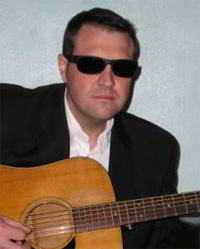
Tom Page, National Federation of the Blind
Tom Page opened his talk with the question: “What is the National Federation of the Blind … and why do we need it?” For tens of thousands of years, when a blind baby was born, the child was let in the elements to die. Since then, just hundreds of years ago, blind people began to organize themselves in guilds to work and began for the first time to have independence outside of the family unit. The deaf in America were the first special needs group to organize for civil rights, such as access to education and jobs. In 1940, the Naontial Federation of the Blind (NFB) was formed during a meeting at Wilkes‐Barre, Pennsylvania. A group of blind people formed the NFB to provide security, opportunity and equality for blind people. Not long after
the inception of the NFB, the Social Security administration formed, but did not recognize blindness as a disability. The NFB advocated for blindness be recognized as a disability. NFB became a mechanism towards bigger civil rights goals for the blind.
NFB takes an “advocate, educate, legislate” approach to the issues facing blind Americans. NFB members do a great deal of advocacy work supporting parents of blind children to be sure children are given access to education as guaranteed by law. Sadly, there are still school districts in Kansas that do not understand the value of braille training (which creates literacy) for blind children, even though these children are entitled to braille training under U.S. law. It is routine for parents to be discouraged from teaching their students braille. Many false arguments are used: that braille would stigmatize the student, or that technology can replace braille. Page counters this thinking with humor, saying, “I never thought of reading as a stigma.” NFB makes advocates available at parents’ request to attend Individualized Education Plan meetings.
Page noted that the issue of sub‐minimum wage affects many blind people. “Sheltered workshops” is the term used to describe these employment situations, in which workshops compete in a closed system for government contracts — a guaranteed business model
for the employer. Under the federal Fair Wages Standard Act, sheltered workshops receive special dispensation to be “sheltered” from labor regulations such as minimum wage. Some people working in sheltered workshops receive as little as 20 cents per hour for their labor. The NFB has tried, unsuccessfully so far, to change the sheltered workshop provision under federal law. There is currently legislation in congress (H.R. 831, Fair Wages for Workers with Disabilities Act) that if passed, could end the sub minimum wage practices of sheltered workshops.
In addition to equal pay for equal work, Page noted other NFB activities that align closely with AAUW action issues. The NFB has developed a STEM curriculum for blind children. NF’B’s Jernigan Institute developed the “STEM to You” curriculum to provide to school districts, as a service. NFB has also held STEM camps for youth; recently a young woman from Kansas attended the national camp. When asked by a Manhattan AAUW branch member, “What would ideal education for blind children be?” Page replied: provide children early braille and cane training — this establishes literacy and independent mobility. Continue forward with added, specialized courses in caning, in addition to standard classes using braille and other adaptations within the regular classroom. By end of high school, the blind student’s proficiencies should be on par with that of typically developing youth.
Following Page’s talk, branch president Barbara Gatewood noted AAUW’s support of education for all people and advocacy for girls with disabilities, citing information from national AAUW that “girls are less likely to be diagnosed with disabilities; underrepresented in special education; and more likely to earn lower wages following graduation.” Those wishing to learn more about the National Federation of the Blind can visit the NFB website at www.nfb.org.
OCTOBER 13, 2014 BRANCH PROGRAM
October Meeting Focuses on Local Government
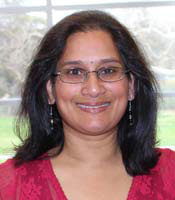
Usha Reddi, City Commissioner
Usha Reddi, city commissioner, hosted the October branch meeting at City Hall and presented the evening’s program, “An Inside Perspective of Local Government.” Reddi shared her career and life path as a parent, teacher, and elected official. She holds a master’s degree in Leadership Studies from K‐State. She is a first grade teacher in USD 383, where she was honored as teacher of year in 2010. Reddi serves on numerous boards in the Manhattan community. She was elected to the Manhattan city commission and has served now for two years.
Reddi has been a member of the Manhattan area community for more than twenty years. Her perspective as a public school teacher and former single parent make her a strong advocate for education, quality of life, and social services.
Reddi discussed several policy issues facing the Manhattan community and noted why we need women in elected government positions: over 15,000 single mothers are raising children in the Manhattan area as compared to about 170 single fathers. There is a great demographic difference in how men and women are using public infrastructure. Reddi argues for infrastructure that changes people’s futures, like the public library, considering the impact that reading and being read to makes in children’s academic success. Reddi argues for quality of life and education in Manhattan. She sees that quality of life is what artiracts and keeps people in Manhattan. “Children are our economic developers of the future,” we have to put them first. Reddi and her colleagues have worked hard to restore social service funding that was lost in previous commission years. Reddi’s upcoming mayoral term will follow commissioner McCullough’s term as mayor. Reddi notes that this is a first for the city of Manhattan: two female mayors, consecutively. Reddi feels she brings a different perspective to the table that prioritizes children, women, and families. Reddi called for more women in government to represent our local, state, and national demographics. As she put it, women have a wealth of information and life experiences to contribute to political leadership.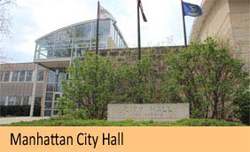
Asked what advice she would offer other women seeking public office: “Plenty of people want you to fail. Don’t surround yourself with them; tune them out. Surround yourself with supportive people who want you to succeed.”
SEPTEMBER 8, 2014 BRANCH PROGRAM
Speakers Share University – Military Relationship Benefitting Children
The 2014-2015 AAUW program year began the 8th of September with a duo of speakers from Kansas State University’s College of Human Ecology. Marlene VerBrugge and Ann Domsch enlightened the members about the nineteen year partnership the university has had with the U.S. military.
Land grant universities around the country via their extension units have created, adapted, and sustained after school programs for youth using 4-H clubs as the tool of implementation. The partnerships began in 1995 when the US Army was searching for after school childcare. Since its inception, the partnership has flourished and has now grown to include services on Navy and Air Force bases around the world. Besides coordinating the programming, curricula and implementation on new military bases, Ms. VerBrugge also oversees the program grants from the US Department of Agriculture to the university, totaling over $75 million to date.
Ms. Domsch explained what the Operation: Military Kids program looks like at the local level. In Kansas, military children who live off base are also served. Ms. Domsch coordinates with all school districts who have military families enrolled, including National Guard families. This program, among other offerings, provides training for school personnel to understand the needs of a military child or family.
The Manhattan branch of AAUW is grateful for the work of these two women, and the opportunity we gained by learning about their work. We received multiple handouts of information about their programs.

